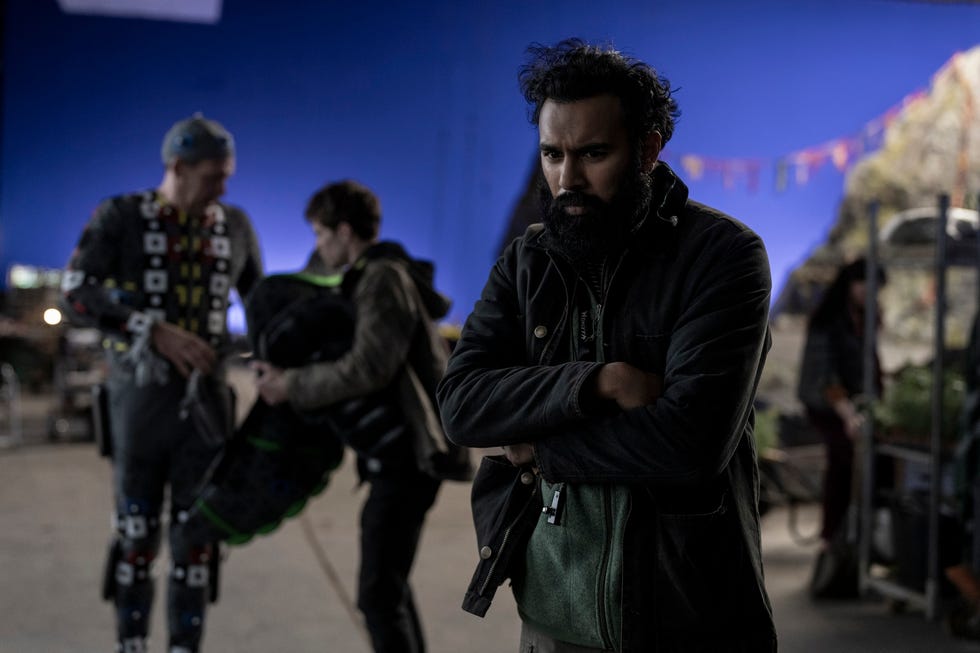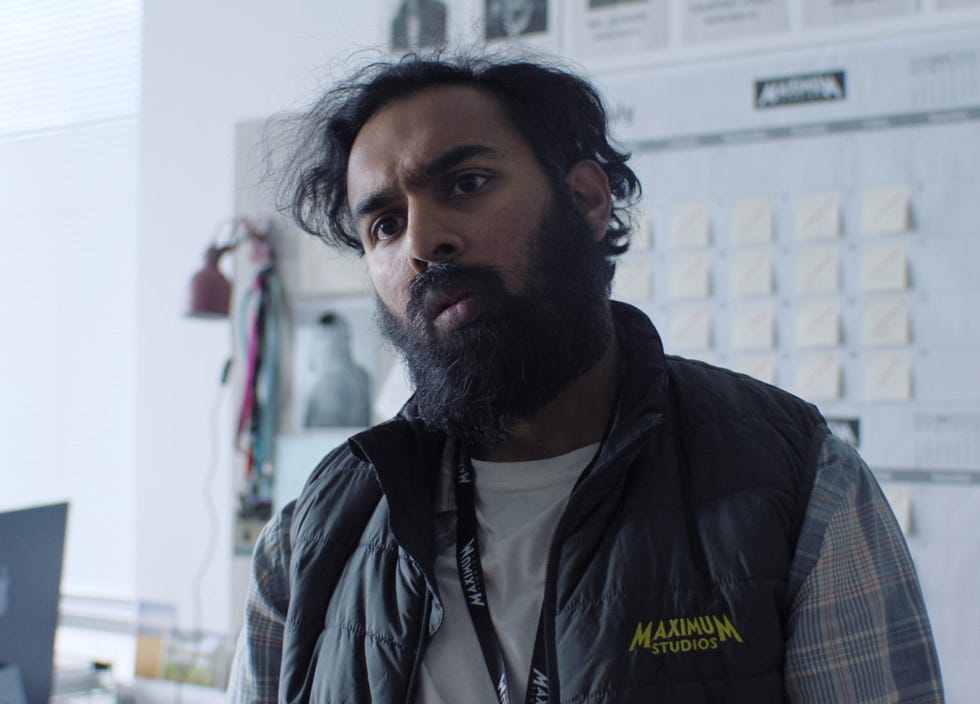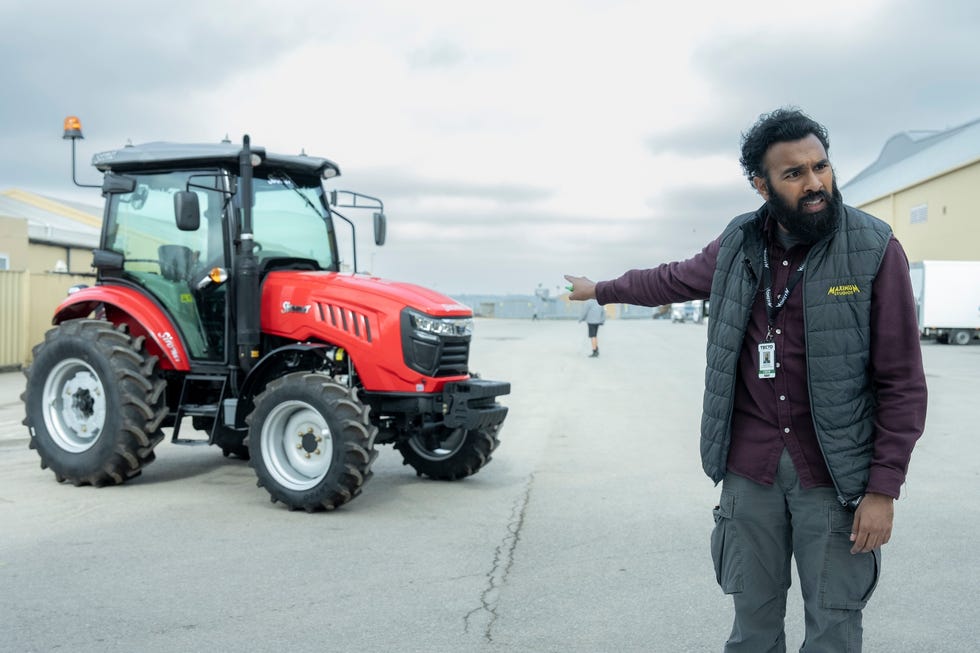YOU CAN SEE it all on Himesh Patel’s face. Throughout the eight first season episodes of HBO’s The Franchise, a fast-paced satire set in the behind-the-scenes world of superhero moviemaking, his character, Daniel, is constantly absorbing pain. As the first AD, the assistant director who manages the day-to-day of a movie production, it’s his job to make sure the film’s metaphorical train remains on the tracks. By proxy, it’s also his job to manage the many predictably huge egos involved in making a tentpole film with an inflated budget.
Sometimes that means dealing with actors who burned their eyes staring into bright lights; other times, it means dealing with a serious pyrotechnics fuck-up. And oftentimes it means managing his increasingly deranged (but supposedly talented) director and producers. But Daniel, as Patel plays him, always keeps his cool. He knows how to handle this stuff—but damn, is it a pain in the ass.
“That might just be my own personality that comes through,” Patel tells me on an overcast Thursday in mid-October as we sit in the restaurant of a Midtown Manhattan hotel. “I’ve always been a bit of an observer and a bit of a quieter person. I find myself sometimes needing to be heard, against my better will. But it is hard.”
Which his character manages the chaos of the B-tier superhero film Tecto: Eye of the Storm (where neurotic beefcake star Adam—portrayed by the wonderful Billy Magnussen—plays a hero whose superpower is a VFX jackhammer), Patel had some challenges of his own on set: The Franchise counts Veep creator Armando Iannucci as an executive producer and comes from creator Jon Brown, who wrote on Succession, so keeping a straight face after last-minute line punch-ups and his c0-stars’ increasingly hilarious deliveries wasn’t easy. “I could name everyone in the cast, and tell you about a scene opposite them where I couldn’t keep my shit together,” he says.
But don’t mistake the show’s satire for condescension towards superhero stories. Iannucci has written a Spider-Man comic book story, as has Patel’s friend, writer Nikesh Shukla. Patel grew up as fan of the animated Spider-Man, X-Men, and Batman series that aired in the 1990s and the Spider-Man movies starring Tobey Maguire released in the 2000s. He cites The Dark Knight and Iron Man, which where both released in 2008, as a pair of films that redefined comic book movies and demanded respect in different ways.
“I’m full of admiration for the worlds those movies created,” he says. “When they’re great, as my character says, there’s nothing better. But when commerce becomes the priority over art, over making a movie that’s actually great, that’s when things start to feel a little thin.”
And at the end of the day, that’s the crux of The Franchise. Can a cast of well-meaning crew members, filmmakers, and actors overcome commercial challenges and constant studio interference to make something that’s actually good? As the show reaches the end of its first season, Patel spoke with Men’s Health about his own interest in the world of superhero filmmaking, managing stress, and just how much of this chaotic satire is rooted in movie-making reality.
MEN’S HEALTH: You haven’t worked on a superhero movie, but you have worked with Christopher Nolan on Tenet, and he’s name-dropped on the show multiple times.
HIMESH PATEL: Yeah…. [Laughs]
MH: You could argue that Tenet is a superhero story in some ways, and it was definitely a blockbuster. Did you bring anything from that experience to The Franchise?
HP: It’s sort of a cross between superhero and spy movie, isn’t it? If I had to imagine being inside the whirlwind of a big superhero movie, then that would be my closest experience. But I’m glad to say that being on that set was nowhere near The Franchise. Because the set of Tecto is chaos, with constant interference from the powers above, whereas Chris—and I think this is what makes his movies so singular—doesn’t allow for any of that interference. That’s part of the deal. He makes his movies, he does his thing, he keeps it real, he keeps it grounded, and he comes out the other side with something really special every single time. That’s the difference.
MH: The season ends on a cliff-hanger. If you guys get to do a season 2…
HP: Fingers crossed.
MH: Where do you see the show, Daniel’s story, going?
HP: The options are endless, and that’s what makes these guys such great writers. The question for me is: where do you pick the story back up? Do you start from the next day? Or do you start six months later, and the movie has either been successful or it’s been a complete failure, and they’re all picking their lives up from there.
With Daniel, where will his ambition take him? As we see in the final scene, he’s in that rare position where he’s being asked, “What do you want?” He can name his terms. I wonder what those terms are. Does he do what’s right, what he purports care about, which is making a good movie? Or does he succumb to the carrot of personal success and personal gain?
MH: I loved the monologue you had at the end of the first episode—”What, leave show business?”—that it was echoed in the finale. It encapsulates not just what drives Daniel, but what drives every character on the show to some extent.
HP: If you stop and think about it for a second, being part of this business at any level is insanity. It’s nonstop, it’s all-encompassing, and it can exhaust you. It can exhaust you in ways you don’t even realize. You’ll have days where you think, What am I doing this for? But you’re either the kind of person who goes, What am I doing this for? I don’t love it enough. I’m out. Or, you’re someone who genuinely has a deep love for what you do, and will do it whatever the weather.
It’s testing for Daniel throughout the series. But he sets out the truth at the end of that first episode. He’s been picking up elephant shit and burning it for years, and he does go home smelling like elephant shit. [Laughs] His wife may have a problem with it, and his kid may have something to say about it too as he gets older. But Daniel is obsessed, and for better or for worse, that’s what makes him good at what he does. He really cares about it. He’s not just there to pick up a check.
MH: Daniel is constantly absorbing all of the stress and madness of everyone on set. What’s your favorite way to de-stress when you need to calm yourself down?
HP: I’m still finding that for myself, really.
MH: We probably all are.
HP: But, look, genuinely—and I’m not just saying this because it’s an interview with Men’s Health—I’ve been working out a lot more lately and it’s really been helping. It’s a great habit. I’ve been needing to get into a good routine for a long time, and I’m finally doing it. That’s been great.
MH: Was there a specific reason you made that change?
HP: The personal trainers I’m working with now, they run a gym in London called The Lighthouse that’s a great gym for professionals in the industry. They’re a really great bunch. I met them because I was doing a film last year where I had some intimate scenes, and I wanted to feel good about myself. I know I can’t transform my body in two months, but I wanted to just see what I can do.
But when you’re shooting a show, the hours are long. Even though there was a great gym at the studios we were shooting at, it just wasn’t easy to find the time. I did my best, and I’m getting into a better routine now, and it’s been a great way to destress.
MH: Some of your co-stars have been in superhero projects. Richard E. Grant was in the first season of Loki and Daniel Brühl was in Captain America: Civil War and The Falcon and the Winter Soldier. Did they have any particular insight into that world?
HP: I can’t remember what Richard’s experience was, but I’m sure it was fine, because he didn’t really offer it up as anything negative. Daniel also said he had a great time working with Marvel.
I think the show is really about what can happen in any genre of filmmaking when commerciality overrides artistic endeavor. The period during which Daniel was in the Marvel world, it was pretty artistically sound; they were building to something and they knew exactly where they were going. That direction just seems like it’s become less clear. But any creative endeavor has its difficult periods, and there are still so many very clever people working on those movies. So who knows where it will lead?
MH: Every episode of The Franchise introduces some new, ridiculous on-set issue. How much of that comes from actual experience or industry chatter, and how much comes from the writers’ imagination?
HP: There were things in this show that I thought were wholesale made up, that I then learned were based on fact. I wouldn’t want to tell you which exactly, or betray our writers’ sources. But there was even crazier stuff for real life that the writers didn’t include because they thought, We can’t put this in the show. People will think we’re being too silly.
This post was originally published on here











